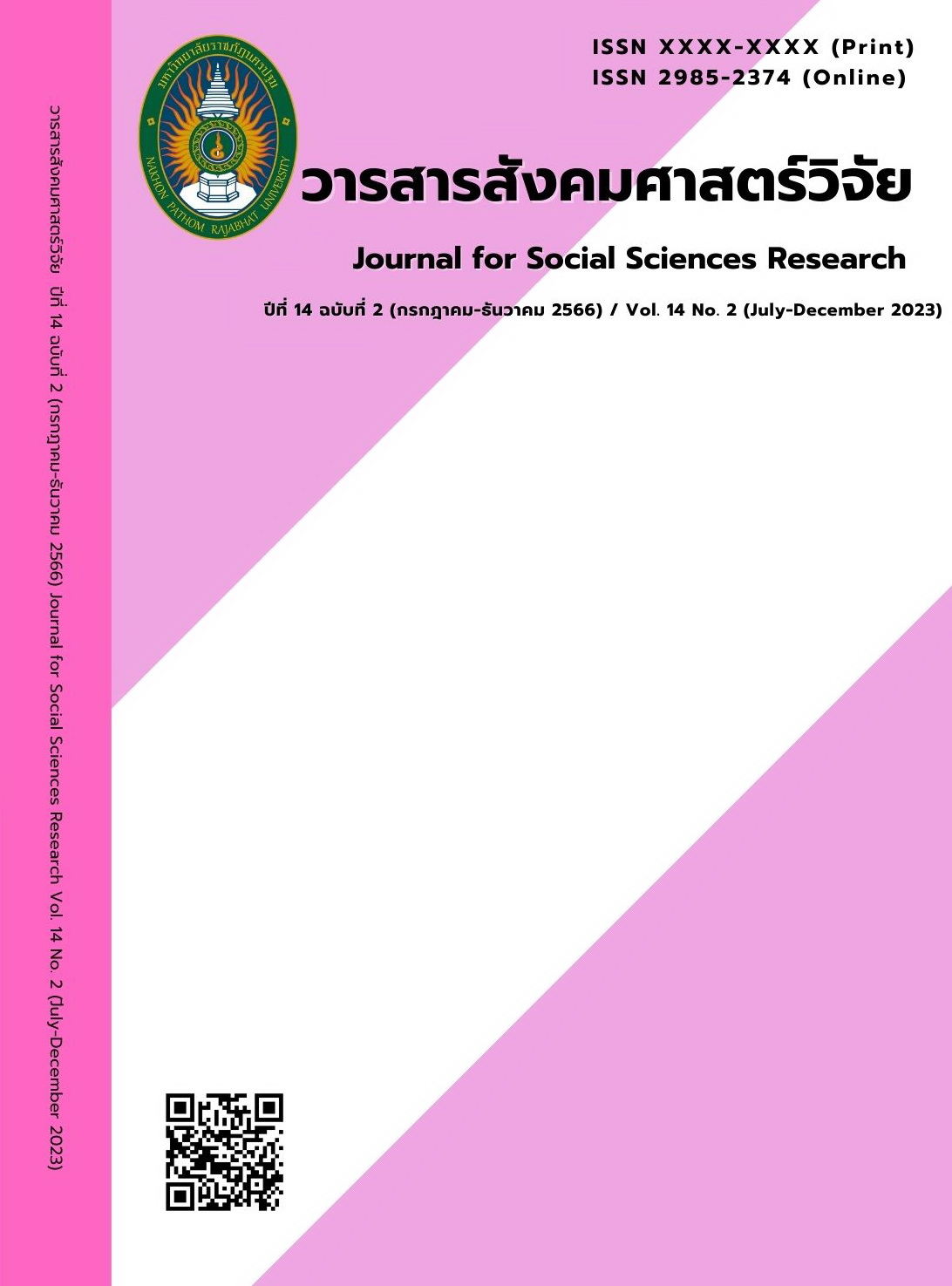GUIDELINES FOR ONLINE LEARNING WITH GAMIFICATION FOR ELEMENTARY SCHOOL TEACHERS
Main Article Content
Abstract
The objectives of this research were to 1) synthesize the documents and research related to online learning management with gamification, and 2) study the guidelines for online learning management based on the gamification concept for elementary school teachers. The methodology used was documentary research. The studied documents included 20 books, textbooks, and related documents, and 10 research papers. The research samples were 10 experts and 5 elementary school teachers. The research instruments used were 1) a form for synthesizing documents and related research papers, and 2) two sets of the structured interview form about the guidelines for designing online learning for experts and elementary school teachers. The data were analyzed by content analysis from the documents and related research and the interviews with experts and elementary school teachers.
The results of the study found that 1) according to the synthesis of relevant documents and research papers, it can be seen that online learning based on gamification concepts has four key principles. (1) The content should be interactive and be designed in various formats, e.g., games, puzzles, and skill-building activities. (2) Learning format should be varied, fun, and arouse student interest. Game mechanics, such as point and competition, may be used to motivate learners to join the activities. (3) Technology should be easily accessed and suitable for elementary students and help learners to experience simulated learning. Game-based learning technology can be used to help learners learn through game playing, e.g., computer game or board game. (4) Assessment and evaluation based on gamification concept should focus on skill and process assessment, rather than knowledge. Various assessment methods, such as testing, observation, interview, or grading, may be used and feedback should be regularly given to learners. 2) Guidelines for online learning based on the gamification concept can be summarized as follows: (1) defining learning objectives, (2) choosing the right game mechanics, (3) using a variety of gamification elements, (4) creating an interesting storyline or theme, (5) using interactive content, (6) providing immediate feedback to learners, (7) designing learning activities that promote cooperation and competition, (8) adjusting game mechanics according to content, (9) using technology effectively, (10) providing incentives or motivation according to learners’ needs, (11) having instructor participation in the online classroom, (12) having parent participation in online learning, and (13) conducting online assessment and evaluation.
Article Details

This work is licensed under a Creative Commons Attribution-NonCommercial-NoDerivatives 4.0 International License.
บทความที่ได้รับการตีพิมพ์เป็นลิขสิทธิ์ของมหาวิทยาลัยราชภัฏนครปฐม
เนื้อหาของแต่ละบทความเป็นทัศนะของผู้เขียน ซึ่งที่ปรึกษา บรรณาธิการ กองบรรณาธิการ และคณะกรรมการบริหารวารสารไม่จำเป็นต้องเห็นด้วย หรือร่วมรับผิดชอบใดๆ
References
จิรวุฒิ มณีรัตน์. (2563). การประยุกต์ใช้โปรแกรมออนไลน์ในการจัดการเรียนการสอนด้วยแนวคิดเกมมิฟิเคชัน. วารสารเทคโนโลยีและนวัตกรรมการศึกษา, 10 (1), 1-10.
ใจทิพย์ ณ สงขลา. (2561). เกมมิฟิเคชัน: แนวคิดและการนำไปใช้. วารสารวิชาการมหาวิทยาลัยราชภัฏสกลนคร, 10 (2), 1-11.
ทิศนา แขมมณี. (2559). ศาสตร์การสอน: องค์ความรู้เพื่อการจัดกระบวนการเรียนรู้ที่มีประสิทธิภาพ (พิมพ์ครั้งที่ 20). กรุงเทพฯ: สำนักพิมพ์แห่งจุฬาลงกรณ์มหาวิทยาลัย.
นภาพร บุญศรี. (2565). การพัฒนารูปแบบการเรียนการสอนออนไลน์โดยใช้การจัดการเรียนรู้แบบร่วมมือร่วมกับวิธีการสอนตามรูปแบบ ARCS เพื่อส่งเสริมแรงจูงใจใฝ่สัมฤทธิ์สำหรับนักศึกษาระดับอุดมศึกษา. วิทยานิพนธ์ปรัชญาดุษฎีบัณฑิต สาขาวิชาเทคโนโลยีการศึกษา บัณฑิตวิทยาลัย มหาวิทยาลัยศิลปากร.
เบญจพงศ์ ศรีจันทร์ และกนกพร คงศรีมา. (2564). รูปแบบการเรียนรู้ห้องเรียนเกมมิฟิเคชันกลับด้านบนคลาวด์ เพื่อส่งเสริมทักษะการเรียนรู้ในศตวรรษที่ 21. วารสารวิจัยและพัฒนาทางการศึกษา, 26 (1), 1-13.
ภาสกร เรืองรอง และกิ่งกมล ศิริประเสริฐ. (2563). ผลของการใช้เกมมิฟิเคชันเพื่อส่งเสริมการเรียนรู้ภาษาอังกฤษเพื่อการสื่อสารของนักเรียนชั้นประถมศึกษาปีที่ 6. วารสารอิเล็กทรอนิกส์ สื่อนวัตกรรมและการศึกษาเชิงสร้างสรรค์, 3 (2), 65-78.
วีณา ประชากูล และประสาท เนืองเฉลิม. (2559). รูปแบบการเรียนการสอน (พิมพ์ครั้งที่ 3). ขอนแก่น: คลังนานาวิทยา.
ศุภกร มงคลจิต. (2558). ผลของการจัดกิจกรรมการเรียนรู้วิชาวิทยาศาสตร์ตามแนวคิดเกมมิฟิเคชัน เพื่อเสริมสร้างแรงจูงใจในการเรียนของนักเรียนชั้นประถมศึกษาปีที่ 2. วารสารอิเล็กทรอนิกส์ทางการศึกษา, 11 (4), 450-464.
สถาพร จะนุ. (2565). การพัฒนารูปแบบการเรียนออนไลน์แบบสร้างความสัมพันธ์ตามแนวคิดเกมมิฟิเคชันเพื่อเสริมสร้างแรงจูงใจใฝ่สัมฤทธิ์และทักษะการทํางานเป็นทีมในการเขียนโปรแกรมของนักศึกษาระดับปริญญาตรี มหาวิทยาลัยราชภัฏ. วารสารมหาวิทยาลัยราชภัฏยะลา, 26 (1), 99-108.
เอกชัย ไวยโสภี. (2565). การจัดการเรียนรู้ออนไลน์ตามแนวคิดเกมมิฟิเคชันสำหรับครูประถมศึกษา. นครปฐม: คณะครุศาสตร์ มหาวิทยาลัยราชภัฏนครปฐม.
เอกนฤน บางท่าไม้. (2561). รายงานวิจัยเรื่อง การพัฒนารูปแบบการเรียนการสอนอีเลิร์นนิงด้วยกระบวนการจัดการเรียนรู้แบบสืบเสาะหาความรู้ร่วมกับการจัดการเรียนรู้แบบโครงงานเป็นฐานเพื่อพัฒนาผลสัมฤทธิ์ทางการเรียนและความสามารถในการถ่ายภาพสำหรับนักศึกษาระดับปริญญาตรี. นครปฐม: คณะศึกษาศาสตร์ มหาวิทยาลัยศิลปากร.
Berger, J. (2014). Contagious: Why things catch on. New York, NY: Simon & Schuster.
Deci, E. L. & Ryan, R. M. (1985). Intrinsic motivation and self-determination in human behavior. New York, NY: Springer.
Deterding, S., Dixon, D., Khaled, R. & Nacke, L. (2011). From game design elements to gamefulness: Defining gamification. In Proceedings of the 15th International Academic MindTrek Conference: Envisioning Future Media Environments (28 September pp. 9-15). New York, NY: Association for Computing Machinery.
Hamari, J., Koivisto, J. & Sarsa, H. (2014). Does gamification work?--A literature review of empirical studies on gamification. In The 47th Hawaii International Conference on System Sciences (6-9 January pp. 3025-3034). Waikoloa, HI: The Institute of Electrical and Electronics Engineers.
Kapp, K. M. (2012). The gamification of learning and instruction: Game-based methods and strategies for training and education. San Francisco, CA: Pfeiffer.
Lee, E. (2012). Gamification: Game mechanics in non-game contexts. Sebastopol, CA: O’Reilly Media.
McGonigal, S. (2011). Reality is broken: Why games make us better and how they can change the world. New York: Penguin Books.
Pappas, C. (2013). The gamification of learning and instruction: A review of the literature. In M. Spector, M. Merrill, J. van Merriënboer & M. Driscoll, Eds. Handbook of research on educational communications and technology (4th ed.). (pp. 653-675). New York, NY: Springer.
Pinyosinwat, S. (2020). The challenges of education in Thailand. Bangkok: Chulalongkorn University Press.
Ritter, S., Cody, M. & Vorderer, P. (2013). Gamification: A look at the empirical evidence. In M. Vorderer, U. Klimmt & J. H. Hamari, Eds. Playing computer games: Motives, responses, and consequences. (pp. 191-210). New York, NY: Routledge.
Rungchareonkiat, D. (2022). Development of gamification learning environment model using design-based learning to enhance innovative thinking of undergraduate students in education. Journal of Research and Curriculum Development, 12 (2), 39-47.
Werbach, K. & Hunter, D. (2012). For the win: How game thinking can revolutionize your business. Philadelphia, PA: Wharton Digital Press.


